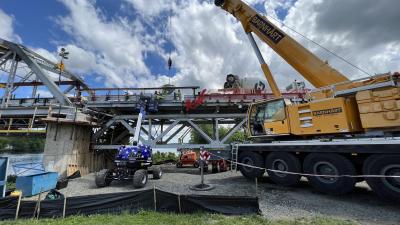No matter what the job, Dwayne McAninch, chairman and CEO of McAninch Corp., knows speed is crucial, and never more so than on one of McAninch Corporation’s current jobs. The Des Moines, Iowa-based contractor is doing all the site prep for the new airport in Branson, Mo., and it’s the biggest job in the company’s history. It also has an extremely aggressive deadline.
“We’re working 24 hours a day, five days a week down here,” said McAninch. “It’s the biggest job we’ve ever done, so we have more equipment assigned to this job site than any other job site we’ve worked on before. We simply cannot afford any downtime.”
McAninch is in charge of Phase 1 of construction for the Branson airport, which is scheduled for a May 2009 opening.
Phase 1 consisted of moving approximately 10 million cu. yd. (7.6 million cu m) of earth, building the 7,400-linear-ft. (2,255 m) runway and constructing the 3-mi. (4.8 km) entranceway with bridges.
The site sprawled across 600 acres (242 ha), but it was not just its sheer size that made this McAninch’s largest job to date. The terrain of southern Missouri made constructing a flat runway more difficult because McAcinch Corp. had to cut hilltops off and use them to fill huge valleys.
“Anything you do in this area is going to be a challenge because of the mountainous, rocky terrain,” said Greg Hirth, project superintendent. “You just got to get to the bottom and get started.”
The company also will install water, sewer and fueling facilities, construct parking lots and grade for the terminal.
McAninch started on this project in July 2007, and although Phase 1 work will continue throughout 2008, the grueling work of preparing the site will be mostly done in the first quarter of 2008.
McAninch has approximately 75 pieces of equipment and nine service trucks assigned to this job site. The equipment is a mix of excavators, dozers and scrapers. The service trucks include a mix of Dominator mechanics trucks from Iowa Mold Tooling Co. Inc. (IMT) and IMT SiteStar lube trucks.
“Because we’re running 24 hours a day, we have to service the equipment right here, and we have to keep it running,” said Curt Sutton, field mechanics foreman of McAninch. “We never quit, so the machines can never quit.”
Extreme Service
McAninch had dedicated an unprecedented number of service trucks to this job site primarily because of the rocky earth and the little tolerance they have for downtime.
“The rocky terrain down here does a real number on the equipment,” Sutton said. “If it were dirt or soft clay on this job site, we would definitely not need to have nine service trucks down there.”
Because McAninch had worked in the Ozark region before, the company knew what they were getting into when they took on this job.
Hirth said the rocky earth wore down parts so fast that they needed replacing about twice as often as they normally would, and it was even worse for some components.
“Down here, the life of a tire is about a quarter of what it would normally be,” Hirth said. “The rock just chews right through the tires.”
Vibration also took a toll on the equipment.
“Everything gets shaken to pieces, so we have to replace everything — radiators, wiring, pins — so much more often,” Hirth said. “You can’t run this huge equipment on rock and expect it to have the same life as it would in dirt or soft clay.”
On top of fixing the machines that break down and replacing the parts that wear out, the IMT service trucks were tasked with doing preventive maintenance. Aside from routine oil changes, the equipment was greased every shift, and the big excavators were greased four times a day, twice a shift.
In addition, IMT service trucks from various Caterpillar dealerships were on the job site doing warranty work, so there often were more service trucks working alongside McAninch’s.
New Equipment
McAninch had to buy new service trucks to meet the demands of this job. The company already had a fleet of 15 mechanics trucks and three lube trucks, but because of the scope of the Branson job on top of McAninch’s other jobs throughout the Midwest, it had to buy two more trucks for the airport project. With the new trucks, it has just enough service units to cover all of its commitments.
McAninch purchased a 2007 IMT Dominator IV mechanics truck with an 8025 telescopic crane, as well as a 2007 IMT SiteStar lube truck, and these two trucks were among those stationed at the Branson job site.
The Dominator IV truck and the 8025 telescopic crane were introduced in 2007, and this mechanics body was the first one on the market that can accommodate an 80,000 ft.-lb. (10,840 Nm) crane. This was crucial to McAninch’s purchase decision because this job site required extremely large equipment — heavy equipment means heavy parts to service.
“Having the new Dominator IV truck with the 8025 crane on this job site has really increased productivity because we can service more of the larger equipment faster than we could with the previous model,” Sutton said.
When McAninch ordered the 2007 SiteStar lube truck, it had it custom built. The standard SiteStar body’s hose reels are on the back of the truck, and the sides of the body contain the storage compartments.
One of McAninch’s more significant specifications was that the hose reels be mounted on the side of the truck in order to save the operator time on each oil change. McAninch also specified that IMT install steel tanks instead of the customary polyethylene tanks because of the extreme conditions of this job site. IMT’s willingness to build engineered-to-order trucks made these custom specifications possible.
“When our equipment isn’t in the dirt, every second counts,” Sutton said. “We need to get our oil changes done as quickly as possible, so if we can shave off a minute or two here and there, we’ll do it.”
McAninch selected the new enclosed IMT SiteStar lube truck instead of the open version. The enclosed lube truck kept the product tanks warmer, and when oil was warm, the viscosity changed and enabled the product to pump faster. In some cases, this saved up to 15 minutes on an oil change.
“We’re going full-bore 24 hours a day on this job site, so we simply cannot afford downtime,” Sutton said.
Today's top stories















